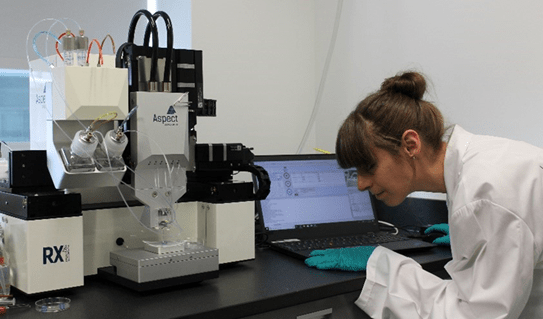Behind every person diagnosed with breast cancer is a team of researchers and doctors committed to helping them live longer and fuller lives. And with your support, incredible progress is being made in breast cancer research. Since 1986, the female breast cancer death rate has dropped by nearly half. This means more mothers are able to watch their children grow up and more sisters, brothers and fathers can spend time with their loved ones.
Research is vital to prolonging and enhancing the quality of life for those living with breast cancer. That’s why along with CQDM and industry partners, the Canadian Cancer Society is investing nearly $10 million to support breast cancer research!
Over the next 3 years, we will be funding 3 cutting-edge breast cancer research projects with the goal to develop state-of-the-art drugs to increase survival rates for Canadians with aggressive and hard-to-treat breast cancer. Researchers for these projects have partnered with leading industry biotech companies and together are harnessing innovative technologies to bring their discoveries to life.
Recreating a tumour and its environment through 3D bioprinting
With the use of 3D bioprinting, Dr Morag Park from McGill University hopes to determine which drugs will be most effective for highly aggressive breast cancers. By using a 3D bioprinter, Dr Park and her team will be able to use living cells from breast cancer patients to more precisely recreate breast tumours and predict which drugs will most likely succeed as treatments.
Not only will the 3D bioprinter be recreating the tumour, but it will also be able to closely replicate the tumour’s environment. The environment around a tumour plays an important role in its survival and growth and can affect which and how drugs work. These new 3D printed models will allow Dr Park and her team to study and test drugs in conditions that closely mimic the real environment in a person, making their results more accurate.
By developing this system, doctors will be able to accurately and quickly test the effectiveness of new treatments such as immunotherapies for people with aggressive breast cancers.

Artificial intelligence used to spare patients from toxic side effects of chemotherapy
Triple-negative is one of the most aggressive forms of breast cancer. Tumours tend to grow and spread quickly and often, people are diagnosed at a later stage when the cancer has already spread to other parts of the body.
Although chemotherapy is traditionally used to treat triple-negative breast cancer, research has shown that some patients may not actually benefit from it. By using an artificial intelligence platform, Dr Mark Basik and his team from the Jewish General Hospital will be able to predict whether chemotherapy treatments benefit certain people with triple-negative breast cancer.
Data from blood and tumour samples from people with triple-negative breast cancer will be entered into an artificial intelligence platform which will then use bioinformatic programs and machine learning techniques to capture any key trends and patterns.
This approach will provide doctors with valuable insights to develop tailored treatment plans for people with triple-negative breast cancer – sparing those who don’t need chemotherapy from its side effects.

Targeting triple-negative breast cancer with miniature robotics
Like Dr Basik, Dr Alain Nepveu from McGill University will be exploring how to effectively treat triple-negative breast cancer. Dr Nepveu’s research will focus on 2 specific proteins that have not been well studied until today.
Dr Nepveu and his team are looking for new drugs that can specifically block these proteins to stop cancer growth. To bring this research project to life, the researchers will be using miniature robotics.
“The development of sophisticated, miniature robotics will allow us to screen hundreds of thousands of compounds to identify rare compounds that can prevent specific biochemical reactions and potentially kill breast tumour cells,” says Dr Nepveu. “The ultimate goal is to find new drugs and increase the remission rates for hard-to-treat cancers.”
The use of miniature robotics will help Dr Nepveu accelerate the discovery and testing of new drugs to create first-of-its-kind treatments for people with triple-negative breast cancer.

Cancer research has helped improve the lives of people with cancer and has led them to live longer, fuller lives. Today, more than 60% of Canadians diagnosed with cancer will survive at least 5 years after their diagnosis. As our knowledge of cancer grows, we will make an even greater impact on Canadians affected by cancer. By investing in cutting-edge research projects like those of Dr Park, Dr Basik and Dr Nepveu, we’ll be able to further understand how to prevent, diagnose, treat and live with and beyond cancer.
